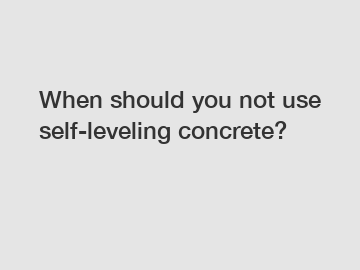Jan. 13, 2024
Chemicals
If you are looking for more details, kindly visit KDOCEL.
Self-leveling concrete has gained immense popularity in various construction projects due to its ability to create a perfectly smooth, level surface quickly and efficiently. It offers a convenient solution for covering uneven substrates, creating a solid foundation for flooring installations, and saving both time and effort. However, despite its many advantages, there are certain circumstances where self-leveling concrete might not be the most suitable option. In this article, we will explore these scenarios to help you make an informed decision for your next project.
1. Significant Structural Issues:

When it comes to significant structural issues, self-leveling concrete is not a sufficient remedy. If your concrete slab has major cracks, settling, or any other structural defects, it is crucial to address those problems before using self-leveling concrete. Applying a self-leveling compound over an unstable or deteriorating surface could compromise the integrity of the entire structure. It is imperative to consult a structural engineer or a professional contractor to assess the condition of the substrate and recommend suitable solutions.
2. Severe Moisture Problems:
Self-leveling concrete is designed to be self-contained and cure to a hard, durable surface. However, excessive moisture underneath the slab can cause issues such as bubbling, warping, or delamination. High moisture levels can result from plumbing leaks, inadequate waterproofing, or poor drainage. Before applying self-leveling concrete, it is vital to ensure the moisture content in the substrate is within the manufacturer's recommended range. Performing moisture tests such as calcium chloride or relative humidity tests can help determine if self-leveling concrete is suitable for your project.
3. Unsuitable Substrate Material:
While self-leveling concrete can bond well with a wide range of materials, certain substrates may not be compatible. It is essential to avoid using self-leveling concrete on surfaces with high levels of contaminants, such as grease, oil, or curing compounds, as these can hinder proper adhesion. Additionally, some materials like hardwood, vinyl, or linoleum may not provide a suitable surface for self-leveling concrete installation. In such cases, it is better to consult with experts to find alternative flooring options that match your requirements.
4. Extreme Temperature Conditions:
Self-leveling concrete requires specific temperature ranges to cure properly. Extreme hot or cold temperatures can significantly impact the curing process. In extremely hot conditions, the water within the self-leveling compound can evaporate too quickly, leading to shrinkage, cracking, or an uneven surface. Conversely, in extremely cold temperatures, the curing process can take significantly longer, possibly causing extended project timelines. It is advisable to check the manufacturer's guidelines regarding temperature requirements and choose an appropriate time for the installation to ensure successful results.
5. Limited Thickness Requirements:
Self-leveling concrete is primarily used to create a smooth, level surface, and it is not intended for building up significant thickness. If you require a large depth of concrete or need to create a slope, self-leveling concrete may not be the suitable choice. Instead, consider using traditional concrete mixes or consult a concrete specialist to determine the most appropriate approach for your project requirements.
Conclusion:
While self-leveling concrete offers numerous benefits and has become a popular material for leveling uneven surfaces, it is essential to recognize its limitations. Understanding when it is not suitable for a particular project is crucial to avoid costly mistakes and achieve desired results. Consulting with experts, including structural engineers, professional contractors, or concrete specialists, will help you make well-informed decisions regarding the best course of action. Remember, when it comes to construction, selecting the right materials and approaches can greatly contribute to the success and longevity of the project.
For more information, please visit our website.
The company is the world’s best Self Leveling Compound Basecoat Primer supplier. We are your one-stop shop for all needs. Our staff are highly-specialized and will help you find the product you need.
If you are interested in sending in a Guest Blogger Submission,welcome to write for us!
All Comments ( 0 )